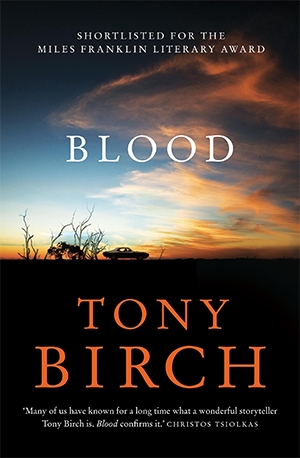Chris Flynn
For ex-Orangeman Billy, history is a nightmare from which he’s trying to get a good night’s sleep. Haunted by ‘all the bloody faces of Catholic lads I done over and worse’, he’s an exile in Thailand, regularly numbing himself with cheap sex, beer, and the occasional fight. He claims he’s never seen the sunrise sober in his life. Things are about to change.
... (read more)As Christos Tsiolkas notes in his back cover puff, Tony Birch’s storytelling skills have been widely acknowledged since the publication of Shadowboxing in 2006. Many people have been waiting to see how Birch would fare with a full-length novel. His début, Blood, is nothing short of outstanding. Birch has finally found a home at University of Queensland Press, where he has his staunch champion, John Hunter, who published Birch’s previous book of short fiction, Father’s Day (2009) under his own imprint, Hunter.
... (read more)Chris Flynn and Peter Carey on the challenging times for mid-list authors
British author Glen Duncan released his eighth novel this year, the title of which, The Last Werewolf, is fairly self-explanatory. Although a much more philosophical (and entertaining) read than one might imagine in our current supernaturally-dominated ‘box-office’ novel landscape, Duncan’s book was a marked departure from an author better known for h ...
Chris Flynn reviews 'You Lose These + Other Stories' by Goldie Goldbloom
A native of Western Australia, Goldie Goldbloom now resides in Chicago with her eight children, whom she gleefully admits, in her amusing introduction to this volume of short stories, to trouncing regularly at Scrabble, ‘with little or no compunction’. Her lyrical and inventive use of language in these eighteen stories comes as no surprise, then. More puzzling is that only four of these ori ...
Chris Flynn reviews 'The Best Australian Stories 2010' edited by Cate Kennedy and 'New Australian Stories 2' edited by Aviva Tuffield
Amore appropriate moniker for this year’s Black Inc. collection might be ‘Bleak Australian Stories 2010’. Either the editor’s taste runs to the morose or Australian writers need to venture outside and enjoy the sunshine a little more...
... (read more)Emmett Stinson has been fiction editor of Adelaide’s Wet Ink magazine since its conception, and came to prominence when his story ‘All Fathers the Father’ won The Age Short Story Competition in 2004. That story is included here in his first collection, as are ‘The Russians are Leaving’ and ‘Great Extinctions in History’, which appeared in the Sleeper’s Almanac in 2007 and 2008, respectively. More recently, Stinson’s story ‘Clinching’ was included in the inaugural edition of Kill Your Darlings. A compendium of his short fiction has thus been in the offing for some time, and it came as little surprise to see his name on the list of writers Affirm Press is showcasing in its interesting new short story series.
... (read more)A Norwegian giant stands astride the deck of a whaling ship trapped in the Arctic ice, watching the other vessels in the fleet burn. Axe in hand, he patiently awaits the arrival of some disgruntled Eskimos, whom he expects to have to fight. Plagued by visions of a lost love, the Norseman commits the tale of his violent life to paper. One hundred and forty years later, a gaunt, dishevelled man climbs into Farrell’s taxi. He carries with him a box containing an ancient woman’s head, a dildo carved from whalebone and the journal of Ole Olavssen, the Norseman. The decrepit man, Bob Kilmartin, instructs Farrell to drive. Despite having just been beaten up by a transvestite colleague on Collins Street, Farrell obliges, desperate for the fare.
... (read more)Painter Dmitri Pangalidis stares out over the baking Sydney rooftops as he waits for his partner, Choosy McBride, to come home from the gallery where she works as a curator. The city is besieged by heat and Pangalidis spends his day lounging on the couch, trying to motivate himself. The first five pages of The Silence contain no dialogue, with Pangalidis wasting yet another day at home, frustrated and filled with doubt about his art. These scenes are interspersed with those of McBride’s arduous return to the apartment across the city. Once the characters do speak, Bruce Mutard’s stark, contemplative meditation on art and beauty sets an unsettling tone that is maintained throughout.
... (read more)




